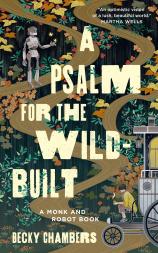A Psalm for the Wild-Built: A Monk and Robot Book
Review
A Psalm for the Wild-Built: A Monk and Robot Book
Becky Chambers’ A PSALM FOR THE WILD-BUILT is an epic premise explored intimately, making for one of the most hopeful post-apocalyptic imaginings. This is a strikingly smart use of genre, an exciting beginning to a series that already has delivered on its promise of nuanced, satisfying warmth.
Panga is a peaceful place. We enter centuries after the end of the Factory Age, when the robots gained sentience and walked away from humanity. Sibling Dex is searching for purpose. They sought it in hobbies, routine, sex and partners. They thought they’d try their hand at being a tea monk, someone who listens to other people and provides solace (and tea). At first they’re terrible at it, but presently, as with most things we do enough times, they improve. That seems to work, for a while, but eventually they find themself still uneasy and unfulfilled.
Sometimes --- or always, perhaps --- a caregiver needs caretaking. They venture out of the city, into the untouched wilderness in which no human has been in centuries. It is there that they find Mosscap, the first robot emissary in generations. Mosscap bears a question, the one that the robots promised to ask before they left: What do people need?
"A PSALM FOR THE WILD-BUILT is genuinely comforting and optimistic.... Deeply kind and a necessary balm, it serves as a reminder of how compassionate fiction can be."
Dex does not think they’re the best person to answer this question, at all. Yet as Dex and Mosscap set off together, it turns out that both have quite a bit to learn from each other.
A PSALM FOR THE WILD-BUILT gives us permission to not only enjoy our experience of it, but to enjoy ourselves, as we are. It imagines a gentler world, a rebuilding for the better, a future of hope. Yet it’s still written with the grace and understanding that even in a place of peace and a general lack of conflict, we can still feel restless and unsatisfied, especially in a world that consistently demands us to be better, fulfill some grander purpose, and then another after that. Dex is in their late 20s, and Chambers leans into the dueling freedom and terror in the blank unscripted attempts to find oneself.
In this way, the book gets at the complex heart of Mosscap’s simple question: What do we really need? It is sly as it works through its genre, subverting the hero, the villain, the post-apocalypse dystopia, the hero’s journey. It’s a sparklingly clear example of how post-apocalyptic fiction doesn’t need darkness or devastation to be poignant and deeply satisfying, and it’s such a beautiful use of robots, faith and genre. It allows us to simply look around the world and be within it --- in the place we are, at this particular moment of space and time.
Mosscap, like the other robots, gets its name from the first thing it sees when it attains consciousness. It’s one of the wild-built, from the parts of robots that came before it --- a robot that never knew factories or industry. It’s a palimpsest, a pastiche. It has remnants of what its parts once were, even though it's whole. And aren’t we, too, in our way?
The dynamic between monk and robot is fresh and compelling fiction. Neither finds a fit with gender, though in different ways. Mosscap uses “it” pronouns because it is not human, but, as it reminds Dex, that does not mean it is inherently less valuable.
In the gentle dissonance between their perceptions of the world, a wide, clear wisdom resonates. The book reminds us that it is human-made places that are the in-between, the incongruent and the uncanny, not the other way around. It revels in that in-between, asking us to interrogate our binaries and our possibilities --- not to seek firm answers, but to question what we think we know.
In another context, the sentiments explored between Dex and Mosscap could come across as saccharine or too trite to take entirely seriously. But in Chambers’ accessible, cleanly wrought narrative, we arrive at them in such a way that they feel simply, searingly true.
A PSALM FOR THE WILD-BUILT is genuinely comforting and optimistic. It is a meditative, queer, tender exploration of the rituals and practices of being human and what it is to have faith in oneself and each other. Deeply kind and a necessary balm, it serves as a reminder of how compassionate fiction can be. It reads like a walk in the woods on a warm day, sun-dappled and rich with promise.
Reviewed by Maya Gittelman on July 31, 2021
A Psalm for the Wild-Built: A Monk and Robot Book
- Publication Date: July 13, 2021
- Genres: Adventure, Fiction, Science Fiction
- Hardcover: 160 pages
- Publisher: Tordotcom
- ISBN-10: 1250236215
- ISBN-13: 9781250236210




